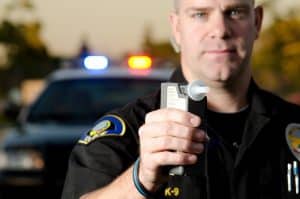Issues with DUI Breathalyzers or Blood Tests
 Breathalyzers and blood tests are often used to prove that a person committed a DUI (driving under the influence). However, these tests are fallible. It’s not uncommon for either type of test to result in questionable accuracy or for administrators of these tests to improperly handle them. If those carrying out the tests didn’t carefully take each step or failed to consider issues that might impact the results, this could damage their ability to use them as evidence. An attorney who knows how to challenge BAC tests can help you fight back against the charges. If your lawyer can eliminate the prosecution’s evidence of intoxication, you may be able to argue for the court to reduce or dismiss the charges.
Breathalyzers and blood tests are often used to prove that a person committed a DUI (driving under the influence). However, these tests are fallible. It’s not uncommon for either type of test to result in questionable accuracy or for administrators of these tests to improperly handle them. If those carrying out the tests didn’t carefully take each step or failed to consider issues that might impact the results, this could damage their ability to use them as evidence. An attorney who knows how to challenge BAC tests can help you fight back against the charges. If your lawyer can eliminate the prosecution’s evidence of intoxication, you may be able to argue for the court to reduce or dismiss the charges.
Common issues with Breathalyzer tests
Here are some common problems associated with Breathalyzer tests:
Calibration and maintenance errors: If law enforcement officers fail to maintain Breathalyzer devices, they will not provide accurate results. Incorrect BAC readings may falsely indicate that you are guilty of a DUI-related charge. If there is evidence that the machine was not properly calibrated, your attorney can challenge the test, and the court may exclude the results.
User error or improper use: If the officer who administers the test makes any procedural errors, they can compromise the accuracy or reliability of the Breathalyzer test.
Mouth alcohol contamination: Breathalyzers work by measuring alcohol from deep lung air. However, there are ways for the test to come up with false results that indicate high BAC levels when the driver is not, in fact, intoxicated. Burping, vomiting, or recently consuming alcohol can cause false BAC readings.
External environmental factors: Certain environmental factors can interfere with Breathalyzer readings. For example, volatile chemicals like paint fumes, cleaning agents, or gasoline vapors can cause falsely elevated results. People with certain jobs or hobbies may come in contact with these chemicals and have them on their person, which could influence the tests.
Medical conditions: Medical conditions such as diabetes, acid reflux, or ketoacidosis (a condition where the body produces ketones) can lead to the presence of acetone in the breath. The Breathalyzer may misinterpret the acetone as ethanol (alcohol). Individuals with certain lung conditions may also have difficulty producing an adequate breath sample, leading to false readings.
Fermented foods: Foods like kimchi, sauerkraut, pickles, kombucha, and yogurt are fermented. The chemical reaction that takes place in the fermentation process creates a small amount of alcohol, which can lead to false positives on Breathalyzer tests for those who recently consumed these foods.
Issues with DUI blood tests:
DUI blood alcohol tests are chemical tests that measure the amount of alcohol or drugs in someone’s blood. Like Breathalyzer tests, blood tests can cause problems and yield inaccurate results. Here are some of the potential problems with these tests:
Improper collection or handling of samples: Law enforcement officers must use trained professionals to collect blood tests and follow strict procedures to avoid contamination or degradation of the sample. If the person administering the test does not draw the blood properly, store it at the right temperature, or mix the sample with the correct preservatives, they can compromise the results.
Contamination of the blood sample: Contamination during collection or storage can introduce alcohol or other substances that may artificially elevate the BAC reading. In cases of improper storage, bacteria may alter the sample over time, leading to inaccurately high BAC levels.
Lack of proper chain of custody: A blood sample must be properly tracked from collection through analysis. The chain of custody policy is there to ensure that no one tampers with or loses the sample or mixes it up with other samples. If those handling the sample break the chain of custody, the test results may become unreliable and inadmissible in court.
Laboratory testing errors: People test blood samples in a laboratory, and human error during testing, improper use of equipment, or malfunctioning machinery can lead to inaccurate results. Cross-contamination between samples in the lab could also affect the outcome of the test by incorporating contents from someone else’s test.
Medications: Certain medications can impact your BAC, including:
- Certain cough medicines
- Cold and flu medicines, including some forms of Tylenol
- Allergy medications, such as Benadryl
- Vicks
There might be other issues, depending on the facts. It’s up to your attorney to review the facts and look for any possible avenues to challenge the prosecution’s evidence.
What should I do if there is a problem with my breathalyzer test?
Both Breathalyzer and blood tests can be strong evidence, which means they might be difficult to challenge in a DUI case. However, it’s important to know that they have potential flaws. If you are facing DUI-related charges, you need to speak to a dedicated criminal defense warrior who is ready to analyze every aspect of your case and look for ways to fight back against the prosecution.
At Waynick Law, our Nashville DUI defense attorneys are ready to defend you against the charges, protect your rights, and stand up for you and your future. If you believe there may have been an issue with the Breathalyzer or blood tests related to a DUI arrest, having a knowledgeable DUI lawyer by your side is critical. Call us or fill out our contact form to schedule your initial consultation today.

Attorney Rodger Waynick helps clients throughout Middle Tennessee with criminal defense matters, including those involving DUI defense and drug crimes. Contact his offices in Nashville or Dickson today for a consultation.
